Kuchibuyi Explosion Raises Alarm Over Terrorism Threat in Nigeria’s Capital
As residents of Kuchibuyi in Nigeria's FCT continue to mourn their loss amid panic following an IED explosion, we examine what this means for the territory.
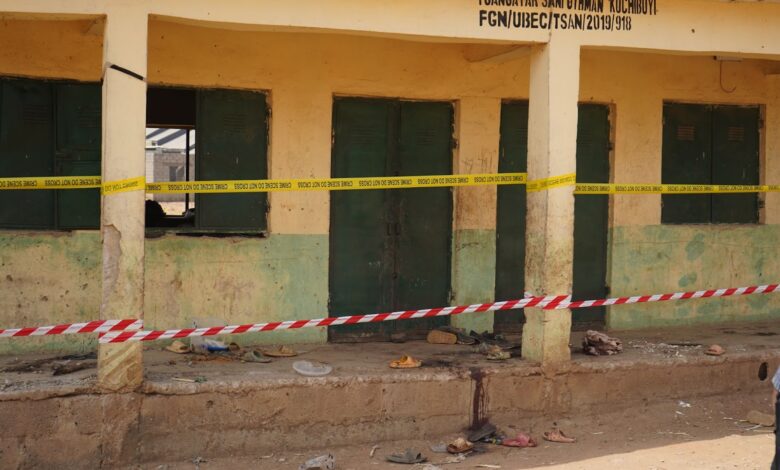
The sun had barely risen that day in the quiet community of Kuchibuyi, a village in Bwari Area Council of the Federal Capital Territory (FCT) in Nigeria’s North-central, when an explosion tore through, leaving deaths and destruction in its wake.
“We don’t know how the whole thing happened, but we heard a blast while we were working inside the house,” said Fatima Maiungwa, who lives beside the incident scene. “We rushed out and saw smoke and dust coming from the building. We saw a man running with two children in his arms, and another man screaming for help. When we moved closer, there was a severed hand on the ground, and blood was everywhere.”
The explosion on Monday, Jan. 6, came from the Tsangayar Uthman Islamiyya School, a modest two-classroom school, which is attended by dozens of almajiri children. According to police investigations, some visitors who came to the school on Sunday, Jan. 5, allegedly brought in the explosive. The FCT Police Command confirmed that the fragments indicated it was an improvised explosive device (IED).
The incident has raised serious concerns about the potential reemergence of bomb explosions in the FCT, following a history of seven such incidents in the territory.
Ben Igweh, the Assistant Inspector General of Police in charge of Zone 7, which covers the FCT and Niger State, revealed that the police are putting measures in place to prevent further occurrences of such incidents. “We have mapped out a lot of measures and crisscrossed the bushes,” he noted. “We are going back to the mountains to see what is happening, but what we want to introduce further is a system of stop and search, so we are rejuvenating all our crime-fighting procedures.”
A harrowing scene
The school, established over seven years ago for nomadic education, now serves as an Islamic school run by Adamu Hashimu, who houses and teaches Almajirai from across the country.
Igweh confirmed that the police had taken Hashimu into custody for questioning.
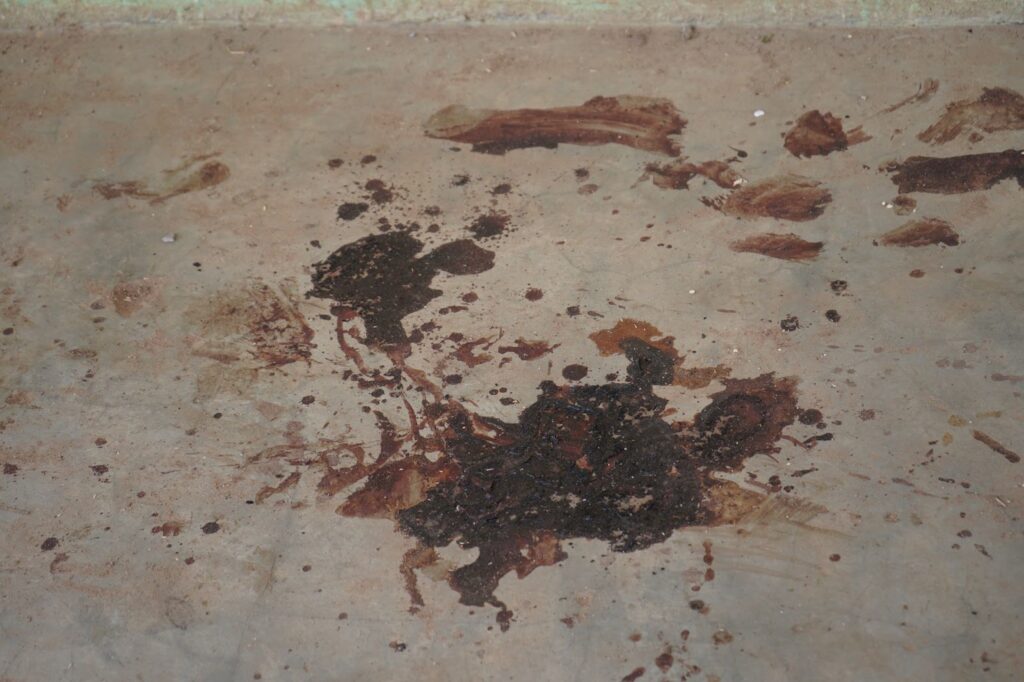
Once alive with the chatter of children, the schoolyard lay silent when HumAngle visited the following day. Blood stains splattered the cream and green-coloured wall, mingling with patches of human flesh that clung to the surface, a stark reminder of the violence that had unfolded.
Scattered flip-flops, bloodied clothes, and a spilt bucket of tofu mixed with ground pepper lay in disarray, bloodstains marking the floor like haunting echoes of lives torn apart in an instant.
Eyewitnesses recounted that chaos erupted following the blast. Fatima Maiunguwa told HumAngle that the Almajiri children ran out of the classrooms in panic, while their teacher was not present then.
“A man was lying lifeless, and a young girl was covered in blood. We also saw two boys who were away from the building, covered in blood. The whole community was under tension. We were confused throughout [the day of the incident] because this has never happened in our community. Our kids were outside, and our husbands were away in their farmlands,” Fatima said.
The explosion killed two, Harisu and Najibu, and left Fauziya, who was hawking tofu, and another victim injured and receiving treatment.
Right place, wrong time
Fauziya had left home that morning to hawk tofu, locally known as Awara, and narrowly survived the explosion. She and her family live near the school. Murja, Fauziya’s mother, recounts the incident in a hoarse voice, her eyes heavy with fatigue, often sighing, a sign of weariness and sleeplessness.
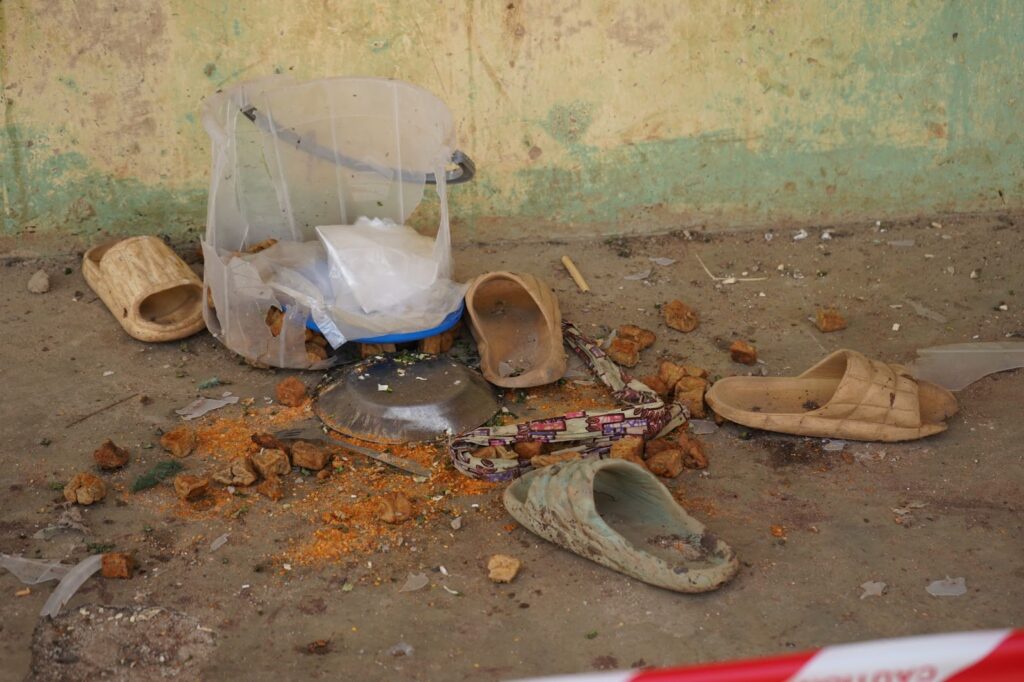
“We just heard a blast, and we saw two people rushing to enter our house,” Murja recounted. “I heard a boy who later died screaming for help, and we rushed there and asked what was going on. We were asked to accept fate. I kept asking what happened, and they said it was fate.”
While trying to wrap her head around the situation, Murja’s eyes narrowed to the chunks of flesh and blood splattered in front of the classroom, and when she looked closer, she saw her Fauziya, covered in blood and panting for breath.
“When I saw her, a part of her left thigh had come off, and she was bleeding profusely. There were also injuries on the left side of her chest,” Murja said.
While one of the boys died on the spot, Fauziya was rushed to the Kubwa General Hospital alongside two others. Her mother said she is responding to treatment, with her father at her bedside.
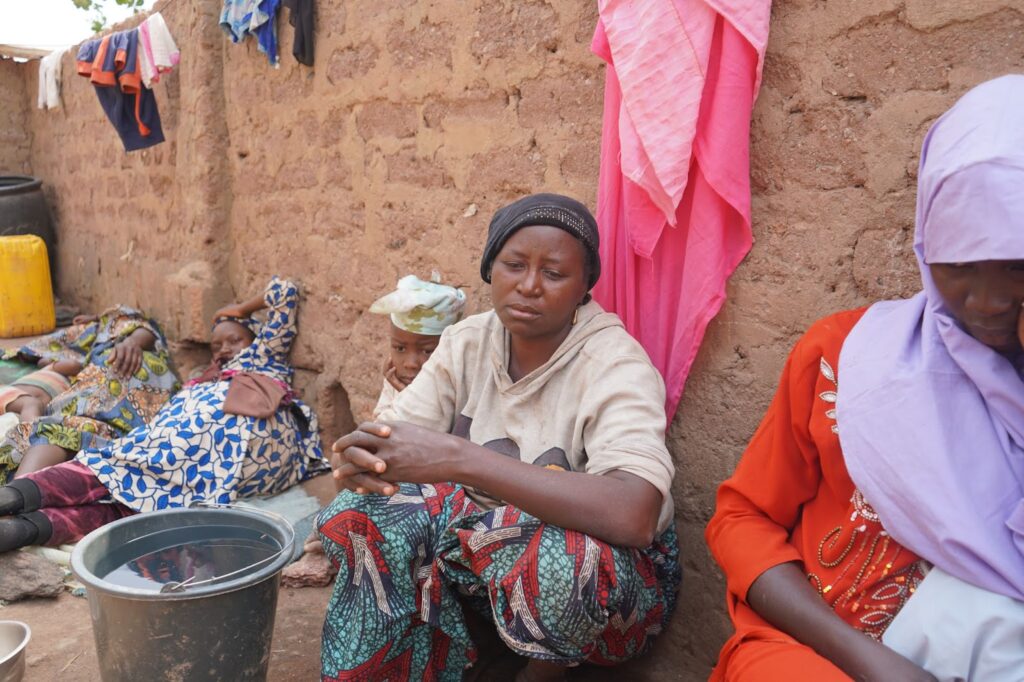
“I was on the phone with her through her father’s line because he was called to the hospital, and she needed him. It was through his phone that I got to hear from her. I asked about her health status, and she told me that she was doing better. She also told me to stop crying or worrying over her,” Murja said.
What makes the FCT vulnerable?
Bwari, where Kuchibuyi is located, is a border area that has been a hotspot for terrorist attacks and kidnappings in recent years. The most recent high-profile abduction case, now widely referred to as the Nabeeha and Sisters abduction, involved the kidnapping of a father, his daughters, and his niece. Public outrage erupted when one of the young girls was killed after the family failed to raise the ransom.
Buried amidst the hilly contours, Kuchibuyi lies about 20 km from Kubwa Express Road, a major entry and exit route to and from the FCT. The bumpy, narrow road that leads to Kuchibuiyi is surrounded by mountains and forests, making it easy for intruders to come and retreat at will. However, residents told HumAngle that the attack was the first of its kind.
“We see these things on the phones or watch it on television that such things happen elsewhere but not here. We have different tribes here, and we all have been living very peacefully, and there has been no case of violence,” said Jamilu Umar Hamza, a Kuchibuiyi resident. “What makes the situation more scary is that we are staying in the FCT, where even outsiders will be shocked that such a thing can happen here.”
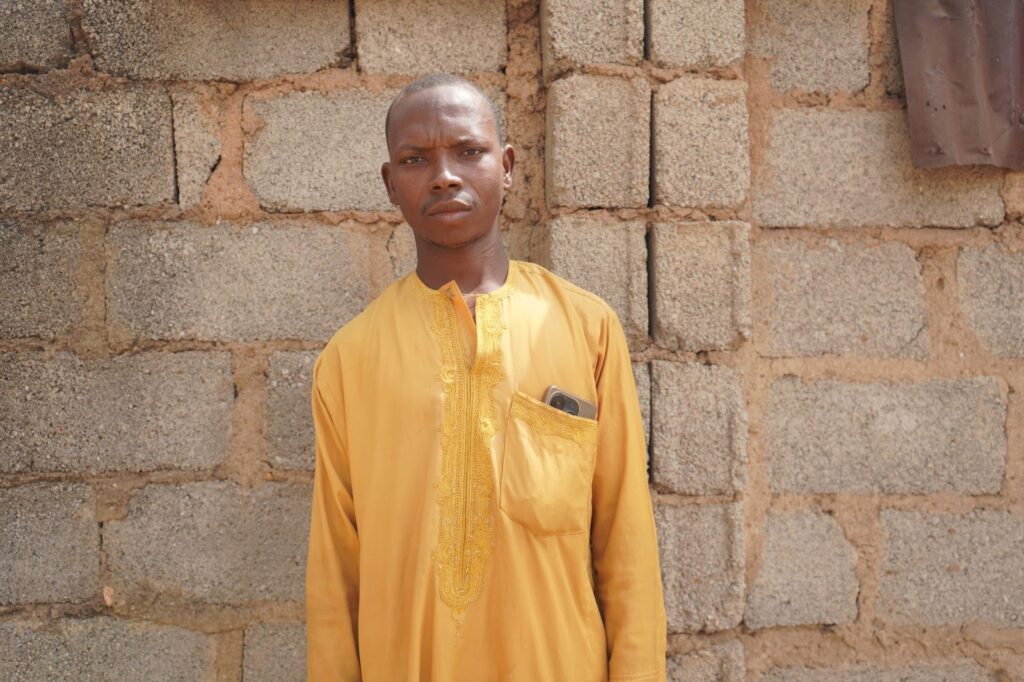
Fatima Maiungwa, another resident, said the incident had left them on the edge. “We are scared because we have little children around here, and our husbands are always away in their farmlands. They only show up once in a while, and we only communicate on the phone,” she said, highlighting their vulnerable state.
Last year, FCT minister Nyesome Wike announced plans to strengthen collaboration between neighbouring states, such as Niger and Kaduna states, to tackle cross-border crimes.
Despite assurances from local authorities, Bwari remains vulnerable to terrorist activities. HumAngle’s investigations show that the community lacks a police station and relies on local vigilantes and hunters for security.
In addition to its proximity to terrorist hotspots like Kaduna and Niger, as well as the mountainous and forested terrain, Kabir Adamu, a security expert and CEO of Beacon Consulting, an Abuja-based security risk management firm, pointed out that “poverty, socioeconomic conditions, and lack of adequate security deployment, has made Bwari one of the highest targeted locations”.
Adamu added that the perpetrators’ intent remains unclear until an investigation is concluded. However, he noted that, “the trend in the last few months has been that these non-state actors are adopting bombing as a method for delivering attacks, and so we should have been ready for it. We are lucky that this bomb was not delivered to its intended location. That’s what I believe, so we need to wake up.”
Call to action
While expressing concerns over the incident, Isiaka Dauda, the community head, vowed to ensure greater security. “I won’t allow anyone from outside to enter my community without proper checks,” he said.
Adamu also called for the better implementation of national counter-terrorism measures, like the National Counter-Terrorism Strategy and the Terrorism Prohibition and Prevention Act. He noted that if these measures had been effectively enforced, the incendiary materials used in the attack, allegedly transported from Katsina to Abuja, might have been detected earlier.
“We need to make sure these instruments are fully understood by every Nigerian so that everyone can contribute to their implementation. At the moment, nobody knows. I mean, think about it. A market woman should be able to know so that when she sees something that can lead to terrorism, she can call a certain number and inform. Likewise, every person,” he added.
Kabir also charged authorities to implement the three Ds (detect, delay, and deter) and the three Rs (response, review, and recover) of security across all six councils of the FCT. “What it means is that, first off, we should be able to detect if an attack would occur and then to delay it or to deter it as the case may be, and if for any reason the attacker is determined and goes ahead to attack, then we should have the capacity to respond,” he explained.
According to him, this would require each village within the six councils to have a dedicated phone number so that security personnel can be dispatched to respond within five to seven minutes of a distress call.
As investigations continue to unfold, Kuchibuyi mourns its loss.
An explosion at the Tsangayar Uthman Islamiyya School in Kuchibuyi, Nigeria, killed two and injured others, sparking fears of renewed violence in the region.
The blast, caused by an improvised explosive device, raised concerns about security vulnerabilities in the Federal Capital Territory, a historical hotspot for attacks.
In response, authorities pledge to improve security measures, including increasing checkpoints and crime prevention efforts. Residents, traumatized by the incident, demand better protection as Kuchibuyi lies in a strategic area susceptible to attacks.
Security experts emphasize strengthening national counter-terrorism strategies to prevent future incidents.
Support Our Journalism
There are millions of ordinary people affected by conflict in Africa whose stories are missing in the mainstream media. HumAngle is determined to tell those challenging and under-reported stories, hoping that the people impacted by these conflicts will find the safety and security they deserve.
To ensure that we continue to provide public service coverage, we have a small favour to ask you. We want you to be part of our journalistic endeavour by contributing a token to us.
Your donation will further promote a robust, free, and independent media.
Donate HereStay Closer To The Stories That Matter




